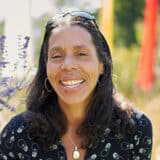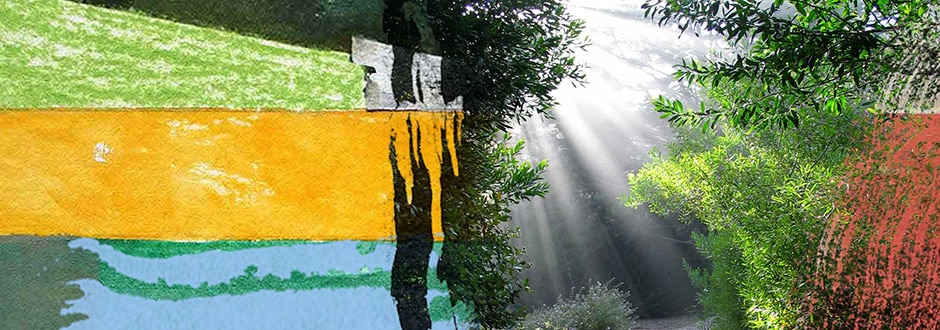Jeanine M. Canty, PhD, is a visionary scholar whose groundbreaking work illuminates the profound connections between consciousness, thought, and our relationship with the natural world. Her teaching weaves together social justice, ecological wisdom, and transformation. As a professor at the California Institute of Integral Studies (CIIS) and guest professor at both Pacifica Graduate Institute and Naropa University, Jeanine has developed and shared her deep understanding of how mind and spirit intersect with ecological healing. Her acclaimed Nautilus Book Award-winning work Returning the Self to Nature: Undoing Our Collective Narcissism and Healing Our Planet, demonstrates how spiritual alienation from the earth creates the narcissistic patterns plaguing our society and social landscape. Her integration of contemplative practice with rigorous scholarship—drawing from Buddhist philosophy and transformative learning—offers tools for expanding our worldviews to heal our inner landscapes and our planet.
Follow Jeanine’s journey while on residency at The New School:
Introductory Lecture | Reclaiming Wildness: Integrating Self Through Practice
Workshop | Bridging Mind and Nature
Article | There Is a Field

Jeanine M. Canty, PhD
Jeanine is a professor of transformative studies at CIIS, telecommuting from Boulder, Colorado. Formerly the chair of environmental studies at Naropa University, she continues to guest teach at Naropa and at Pacifica Graduate Institute. A lover of nature, justice, and contemplative practice, her teaching intersects issues of social and ecological justice, ecopsychology, and the process of worldview expansion and change. She is author of Returning the Self to Nature: Undoing Our Collective Narcissism and Healing Our Planet and her most recent edited book is an expanded, second edition of Ecological and Social Healing: Multicultural Women’s Voices (2025).
From Jeanine:
For many years, I had the honor of teaching an 8-day Wilderness Solo course in the wilds of Southern Colorado at a place called Stillpoint founded by Gia-Fu Feng, a leader in the Human Potential movement, who came to the West from China in the mid-1950s. The time I spent there was long after the intentional community had disbanded—the huts and buildings were only wisps of structures and Gia-Fu Feng had passed decades before, yet the energy of this place was potent with healing and tranquility, along with direct transmission of knowledge and practice. Stillpoint was just as it says.
In contemplating my upcoming time at Commonweal, I am drawn first to place–the somewhat secluded and countercultural community of Bolinas, surrounding by waters and forest, the ancestral home of the Coastal Miwok peoples, now populated by those drawn to being off the beaten path and unincorporated, a majestic point of stillness. The promise of water, silence, nature, and the unconventional, drop me into my body and with a deep out breath at the prospect of a place for contemplation, being with, creativity, and writing. Next I sit with the name Commonweal and its translation as addressing the common good, to serve the welfare of all beings, and dropping in further, see the image of the sound of the name–common wheel—a wheel with many spokes, quite similar to the wheel of dharma, linking the intersectional issues of our times; what it means to be a human within these times; and to choose to show up as a spiritual warrior, or at least hold the aspiration.
Commonweal’s founder Michael Lerner’s words that this is a place “with a vision of contributing to healing ourselves and healing the earth” delights me. My work centers upon social and ecological healing. It is a great honor to be invited as the second visiting scholar at The New School (TNS) at Commonweal. The theme of the invitation and cycle while I am there, “Mind and Spirit” is quite apt for our era. The late and beloved teacher Joanna Macy framed our present times as The Great Turning, an age when systems were collapsing and both new and old systems—those that aligned with sustaining life, nature, were resurfacing. The Great Turning has multiple dimensions including holding actions in defense of the Earth, the creation and resurrection of structural alternatives, and shifting paradigms—transforming consciousness.
My work, as much of Commonweal’s does, addresses this shift in paradigm through transforming consciousness, particularly with addressing the disconnection and duality humans of western civilization have made between self and Earth, mind and spirit.
It is interesting that within the transpersonal communities, there is such distinction between spirit and soul. From an ecopsychology view, both connect us with all sentient beings as well as the unseen worlds, yet the deeper work of soul addresses our collective illness in separating from the collective spirit, psyche, and soul, perhaps a spiritual detour, perhaps a spiritual teaching.
The development of the western mind and its capacity for abstract thinking, while astounding, is deeply out of balance with the web of life, leading its destruction. Small human and individual mind, cut off from larger Mind, is a newer technology that needs greater training and practice.
My intention for my time at Commonweal is to fully inhabit place, to engage in contemplative practice, to write, to connect with the lineage of Commonweal, and to be of service. I am always inspired by the work of my colleague and inaugural TNS scholar Craig Chalquist, and as a fellow ecopsychologist my first intention is to connect with the land, beings, and spirit of Commonweal as well as the larger Bolinas bioregion through walking the land, dreaming, listening, and being. This is a way not only to honor and connect with place, but to ground my self, to be nourished, and to access creativity. The time I am there will coincide with the Cancer Help Program and I aim to synchronize (while not directly in contact with the retreatants) with the precious emotions, and somatic and spiritual healing that will be occurring. As a certified meditation instructor I plan to do formal sitting practice each day for extended time and less informally to work with the contemplative concepts of “listening, hearing, and contemplating” when translating my time in nature and meditation to my writing projects.
I have two current projects to work on. The first is a chapter I have been invited to contribute to the Handbook of Sociocultural Psychology and Sustainability (HSPS): Harmony with Humans and Nature (Edward Elgar Publisher). My chapter is titled “A Depth Psychological Approach to Wellness: Bridging Dualities with Nature and Self” and employs “perspectives across depth psychology, ecopsychology, and Buddhist thought, to addresses the dualities with the humannature relationship as well as the dualities within the western human’s psyche in order to reclaim our ecological and transpersonal identities and to create pathways for healing.” The draft of this work is due in early November, and I have been working on it since the summer, so it will be near completion, and this time will be greatly appreciated for any refinement, as well as further insights.
The second writing project is an article titled “Atonement to the Earth Mother Cybele: An Ecopsychological, Ecofeminist, Archetypal Remembering” and is less conventional with the intent of taking back the monstrous Roman version of this myth and “unpack[ing] and re-story[ing] Cybele as the tale of the disembodiment of human from nature, the original trauma, the separation of the divine feminine and masculine, as well as offer remembrance of our deeper story.” It is a reclamation of wildness.
I am quite eager to dive deeper into the lineage of Commonweal while I am there. I have already started reading pieces online and look forward to accessing the library and archives in person as well as to learn more from the community (when possible). Coming months before the 50th Anniversary feels potent. For some reason I have a history of learning from the lineage holders (including place) of alternative learning and healing institutions from the same time period including Prescott College, Naropa University, Stillpoint, Esalen, and CIIS, and as I start upon my path towards future elderhood, this feels incredibly important.
Finally, and perhaps most important, is to offer something through engaging with the Commonweal community through a lecture, an interview, and an experiential activity. While not set in stone, the lecture will align with the Mind and Spirit theme and my current writing projects, and it may be of interest to include some content from my book Returning the Self to Nature: Undoing Collective Narcissism and Healing Our Planet (Shambhala Publications, 2022). I am so grateful for this invitation!

